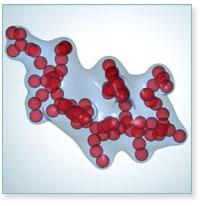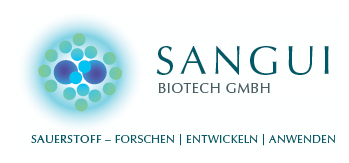Oxygen carriers
Insufficient supply of oxygen to tissue represents the main cause of a variety of illnesses and health disorders (particularly the narrowing of arteries with decreased blood flow). The blood is unable to transport enough oxygen to the affected areas and too little blood arrives.
The indications of these deficiency conditions are numerous and the medical need for therapeutic remedies is huge. Complete or partial arterial occlusions are present in a large number of heart attacks and ischemic strokes. Another big field is increasing the effectiveness of radiation and chemotherapies for carcinomas by improved oxygenation (increase in oxygen content) of the tumors.
Oxygen carrying blood additives enables the blood to which it is added to transport more oxygen und are thus able to significantly improve tissue hypoxia (a lack of oxygen in the tissue) systematically and locally. The only artificial oxygen carriers developed as an additive are "PEGylated hemoglobin hyperpolymers (HP3Hb)" from SanguiBioTech GmbH.
This involves chemically attaching hemoglobin to giant molecules whose water binding is so low that they can be added to blood without significantly increasing its volume. These hyperpolymers are thus not "artificial blood" or a "blood substitute", but are oxygen therapeutic agents as a blood additive. Sangui's blood additive is based on patented formulations and manufacturing technologies. It thus has a variety of unique features.
Sangui Technology
 PEGylation:
PEGylation:PEGylation is a process in which therapeutic or diagnostic biopharmaceutical substances are chemically bonded (conjugated) with polyethylene glycol (PEG). Chain-like structures are attached to the therapeutic or diagnostic agent so that it is almost completely enclosed, thus providing reliable protection against premature degradation by endogenous enzymes or antibodies such as proteases, This "masking" enables the therapeutic or diagnostic agent to withstand attacks by the immune system and enzymatic degradation processes so that it can reach its destination without hindrance and unfold its therapeutic (or diagnostic) effect. In particular with biopharmaceuticals, PEGylation is a very efficient method to achieve substantial reduction in immunogenicity, a significantly higher protease stability and a distinct slowdown in renal excretion (via the kidneys).
